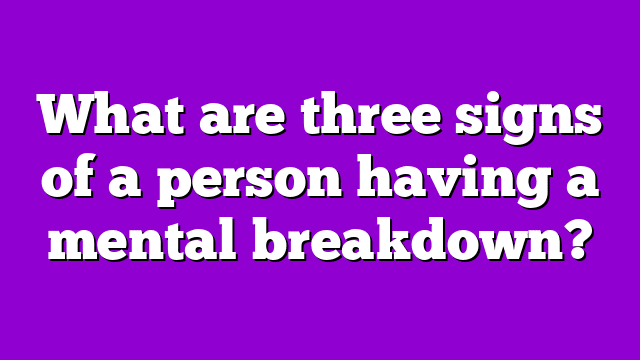Crystal Myths Controversies & Misconceptions
What are three signs of a person having a mental breakdown?
When a person is going through a mental breakdown, it can be difficult to know what to do or how to help. There are several signs and symptoms that can indicate a mental health crisis. These include:
• Extreme and sudden changes in mood or behavior
• Increased irritability or agitation
• Difficulty sleeping or staying asleep
Additionally, there are various symptoms of mental illness, including but not limited to:
• Persistent feelings of sadness, anxiety, or hopelessness
• Loss of interest in activities previously enjoyed
• Difficulty concentrating, remembering, or making decisions
• Withdrawal from friends, family, and social situations
It’s important to note that mental health is complex and unique to each individual. If you or someone you know is experiencing these symptoms, seeking the help of a mental health professional is recommended. Mental illness is nothing to be ashamed of and seeking help is a heroic and courageous step towards healing.
Table Of Contents
- 1 Behavioral changes as a sign of mental breakdown
- 2 Cognitive symptoms indicating a possible mental breakdown
- 3 Emotional stressors that may lead to mental illness
- 4 Physical signs of a potential mental breakdown
- 5 Lifestyle factors and their effect on mental health
- 6 Early warning signs of mental illness
- 7 The importance of seeking professional help for mental health concerns
Behavioral changes as a sign of mental breakdown
Behavioral changes are some of the most evident signs of a mental breakdown. They may emerge suddenly, and typically, they are a noticeable deviation from a person’s usual behavior. Such behavioral changes may include violent and aggressive behavior, isolation, substance abuse, neglecting personal hygiene, and social withdrawal. Other behavioral changes may include impulsiveness, restlessness, inability to concentrate, and difficulty in making decisions. If you suspect a person is experiencing a mental breakdown based on their behavior, it’s crucial to seek professional help immediately.
Cognitive symptoms indicating a possible mental breakdown
Cognitive difficulties often accompany mental breakdowns, particularly when it comes to memory, thought processes, and concentration. For instance, a person may have trouble comprehending simple instructions, have difficulty making decisions, may become forgetful of everyday tasks, and even experience delusional thinking, paranoia, or hallucinations. Cognitive symptoms associated with mental breakdowns can be overwhelming and severely impact a person’s daily life. Therefore, it is crucial to seek professional help as soon as possible.
Emotional stressors that may lead to mental illness
Several emotional stressors may cause or trigger mental breakdowns, including trauma, a bereavement or loss, relationship stress, and work-related stress. Other emotional stressors may include constant worrying, low self-esteem, feelings of hopelessness or despair, and emotional disconnectedness. These stressors may lead to emotional symptoms such as anxiety, depression, and panic disorder. It’s essential to identify the emotional stressors leading to a breakdown and seek professional help.
Physical signs of a potential mental breakdown
Physical symptoms can also manifest in a mental breakdown. Such symptoms may include sleep disturbances, fatigue, headaches, stomach problems, and chest pain. In some cases, a person may exhibit physical symptoms even when no underlying physical illness is present. These physical symptoms should be taken seriously and investigated by a health professional, especially if they appear in conjunction with any of the other signs of a potential mental breakdown.
Lifestyle factors and their effect on mental health
An individual’s lifestyle can have a profound effect on their mental health. Factors such as lack of sleep, inadequate diet, and a sedentary lifestyle can contribute to a range of mental health conditions. Conversely, regular exercise, a balanced diet, quality sleep, and avoiding the use of drugs or alcohol can help promote positive mental health. Thus, it’s essential to maintain a healthy and positive lifestyle to manage or prevent the onset of mental health issues.
Early warning signs of mental illness
Early warning signs of mental illness can include feelings of sadness, irritability, issue concentrating, difficulty sleeping, and appetite changes. Furthermore, people may also become socially withdrawn, have difficulty dealing with daily stressors, or exhibit physical symptoms such as headaches or stomach pain. Identifying early warning signs can help individuals seek professional help before symptoms become more severe.
The importance of seeking professional help for mental health concerns
Professional help is necessary for those experiencing mental health concerns. Experienced mental health professionals can provide supportive treatment and help individuals develop coping skills and strategies to manage or resolve mental health conditions successfully. Recognizing one’s own limitations or those of loved ones and seeking professional help is crucial for positive mental health outcomes. Therapeutic interventions can help individuals improve their overall well-being and quality of life.
In conclusion, recognizing the early warning signs of a potential mental breakdown is crucial. Behavioral changes, cognitive symptoms, emotional stressors, physical symptoms, and lifestyle factors can all contribute to a mental breakdown. Identifying these signs is the first step towards seeking professional help and mitigating more severe mental health concerns. Reach out to mental health practitioners and explore the many treatment options available to effectively manage or treat a range of mental health conditions.

